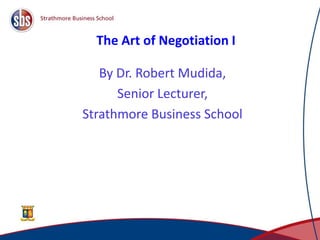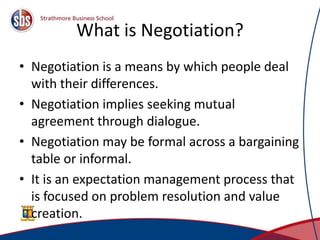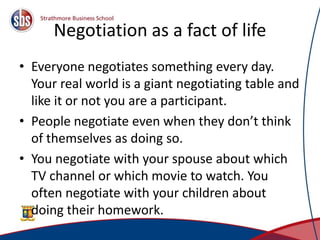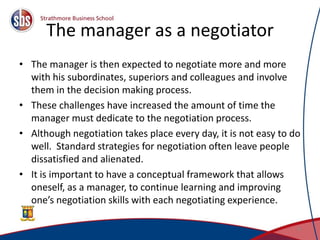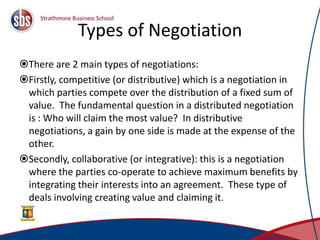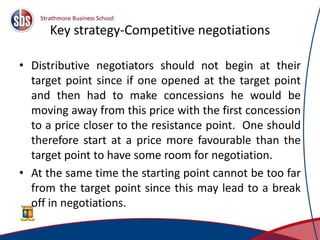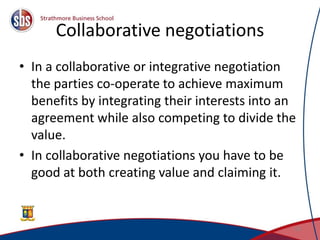Art of negotiations 1
- 1. The Art of Negotiation I By Dr. Robert Mudida, Senior Lecturer, Strathmore Business School 1
- 2. What is Negotiation? • Negotiation is a means by which people deal with their differences. • Negotiation implies seeking mutual agreement through dialogue. • Negotiation may be formal across a bargaining table or informal. • It is an expectation management process that is focused on problem resolution and value creation. 2
- 3. Negotiation as a fact of life • Negotiation is a fact of life. We all negotiate. • We negotiate when we discuss a raise with our boss, we negotiate when we try to buy a house or a car, we negotiate when we are planning for a merger, we negotiate when we meet with union leaders to avert a potential strike and we negotiate when we represent our country in trade either at bilateral or multilateral level. 3
- 4. Negotiation as a fact of life • Everyone negotiates something every day. Your real world is a giant negotiating table and like it or not you are a participant. • People negotiate even when they don’t think of themselves as doing so. • You negotiate with your spouse about which TV channel or which movie to watch. You often negotiate with your children about doing their homework. 4
- 5. Negotiation as a fact of life • Negotiation is a basic means of getting what you want from others. • It involves a back and forth process designed to reach an agreement when you and the other side have some interests that are shared and others that are opposed (as well as some that may be simply different). • Negotiation skills are often presumed incorrectly to be instinctive. 5
- 6. Negotiation as a fact of life • Addressing conflicts both at organisational, local or international level often requires negotiation. • People differ and they use negotiation to handle their differences. • Whether in business, government or the family, people reach most decisions through negotiation. 6
- 7. Negotiation as integral to the managerial role • Negotiation is integral to the managerial role. • Although negotiation can be associated with high profile issues such as collective agreements or the purchase or sale of entire companies, a similar type of negotiation process occurs in the daily interactions of managers with people inside and outside the organisation. 7
- 8. The manager as a negotiator • Increasingly, managers are supposed to act as change leaders thereby requiring the support, ideas, and commitment of other individuals. • This reduces the ability that the manager has to make decisions unilaterally. • Individuals expect their input to be taken into account especially when it relates to how they perform their work, and they want to feel more involved in the organisation. 8
- 9. The manager as a negotiator • The manager is then expected to negotiate more and more with his subordinates, superiors and colleagues and involve them in the decision making process. • These challenges have increased the amount of time the manager must dedicate to the negotiation process. • Although negotiation takes place every day, it is not easy to do well. Standard strategies for negotiation often leave people dissatisfied and alienated. • It is important to have a conceptual framework that allows oneself, as a manager, to continue learning and improving one’s negotiation skills with each negotiating experience. 9
- 10. Styles of negotiation • People often find themselves in a dilemma. They usually see two ways of negotiating: hard and soft. • The soft negotiator wants to avoid personal conflict and so makes concessions readily so as to reach agreement. He or she wants an amicable solution but often feels exploited and bitter. 10
- 11. Styles of negotiation • The hard negotiator sees any negotiation as a contest of wills in which the side that takes the more extreme positions fares better. • He or she wants to win but often produces an equally hard response that exhausts the negotiator and his or her resources and harms the relationship with the other side. 11
- 12. Principled negotiation • The third type of negotiation is principled negotiation developed at the Harvard Negotiation Project. • This approach suggests looking for mutual gains wherever possible and where interests conflict, one should insist on the result being based on some fair standards independent of the will of either side. 12
- 13. Principled Negotiation • Principled negotiation is hard on merits and soft on people. It does not involve tricks or posturing. • It shows one how to obtain what they are entitled to and still be decent. • It enables you to be fair while protecting you against those who want to take advantage of your fairness. 13
- 14. The framework of negotiation • Every negotiation is different but the basic elements of the framework do not change. • The framework can be used if there is one issue or several or if there are two or more parties and also when different issues are involved. 14
- 15. A Multi-disciplinary Field • Negotiation draws from the fields of psychology, decision analysis, law, political science, game theory, organisational behaviour, sociology and common sense. • Negotiation is a primarily a problem solving and value creation process. 15
- 16. Negotiation as a Management Skill • The key to management development is acquiring both skills and knowledge. • Knowledge is learnt more quickly than skills as we grow older it becomes difficult to acquire new skills. • One can have knowledge without having the skill. • Learning a skill requires us to persistently push beyond our comfort zone until the new skill becomes part of our repertoire. • Acquiring competence in a management skill like negotiation is only possible if the individual is willing to extend their own repertoire of behaviours by learning new, more effective ones. 16
- 17. Negotiation as a management skill • In order to be comfortable and competent in negotiations, it is necessary to incorporate new approaches through practice and to reflect on the process in each new negotiation experience: what has worked, what has not worked and what could have been done differently. • This reflection should encompass the examination of one’s own attitudes and behaviour and also those of the other negotiating party. • A conceptual framework is also key to facilitating the learning process. 17
- 18. Journal • Reflect and briefly report on the following areas: • 1. What worked for you in the negotiation? • 2. What did you learn about the negotiation process and about yourself as a negotiator? • 3. “Areas for improvement” that you commit yourself to put into practice 18
- 19. Types of Negotiation There are 2 main types of negotiations: Firstly, competitive (or distributive) which is a negotiation in which parties compete over the distribution of a fixed sum of value. The fundamental question in a distributed negotiation is : Who will claim the most value? In distributive negotiations, a gain by one side is made at the expense of the other. Secondly, collaborative (or integrative): this is a negotiation where the parties co-operate to achieve maximum benefits by integrating their interests into an agreement. These type of deals involving creating value and claiming it. 19
- 20. Key strategy-Competitive negotiations • Distributive negotiators should not begin at their target point since if one opened at the target point and then had to make concessions he would be moving away from this price with the first concession to a price closer to the resistance point. One should therefore start at a price more favourable than the target point to have some room for negotiation. • At the same time the starting point cannot be too far from the target point since this may lead to a break off in negotiations. 20
- 21. Role of relationship • Relationship means little in this tug of war. • Negotiators are not willing to trade value in the deal for value in their relationship with the other side. 21
- 22. Approach to information • Information plays an important role in this type of negotiation. • The less the other side knows about your weaknesses and real preferences and the more it knows about your bargaining strength, the better will be your position. 22
- 23. Key considerations • The first offer can become an important psychological anchor point that sets the bargaining range. Studies show that negotiation outcomes often correlate with the first offer. So start at the right place. • Do not disclose any significant information about your circumstances- including why you want to make the deal, your real interests or business constraints, your preferences among issues or your options, or the point at which you’d walk away from the table. It is beneficial to however let the other side know you have good options if this deal falls through. 23
- 24. Key considerations • Information about the other side can benefit you. Learn as much as possible about the other side’s circumstances and preferences- including why they want to make the deal, their real interests and business constraints, and their preferences among issues or options. • Exploit what you learn about the other side in setting your first offer or demand. • Don’t overshoot since if you claim aggressively or greedily, the other side may walk away and you will have lost an opportunity to make a deal. 24
- 25. BATNA • A key concept in negotiation is the BATNA. • This concept was developed by Fisher and Ury and is the acronym for best alternative to a negotiated agreement. • It is the preferred course of action in the absence of a deal. • Knowing your BATNA implies knowing what you will do or what will happen if you fail to reach an agreement in the negotiation at hand. • Don’t enter a negotiation without knowing your 25
- 26. Collaborative negotiations • In a collaborative or integrative negotiation the parties co-operate to achieve maximum benefits by integrating their interests into an agreement while also competing to divide the value. • In collaborative negotiations you have to be good at both creating value and claiming it. 26
- 28. Creative options • The parties should focus on creative options and not simply which concessions to make. • The more creative you are at coming up with things that are good for both of you the happier both of you will be. • This creativity is only possible if both parties understand their own key interests and the key interests of the other side. 28
- 29. Barriers to creativity • Being afraid to fail • Pessimistic attitude • Too much stress • Action based on rules • Too much is based on assumptions • Too much is dependent on logic • Believing you are not creative 29
- 30. Enablers to creativity • Preparation and knowledge about the problem • Necessity without becoming stressed. • A certain level of trust • Regain a capacity to observe. • Explore using conditional questions such as: • -What if......? • -Assuming ...What....? 30
- 31. Information sharing • Finding opportunities for mutual benefit requires information sharing. • Unlike the distributive situation in which you avoid disclosing information, in an integrative negotiation negotiators are encouraged to: • -Provide significant information about their circumstances. • -Explain why they want to make a deal • -Talk about their real interests or business constraints • -Reveal in general terms their preferences among issues or options. 31
